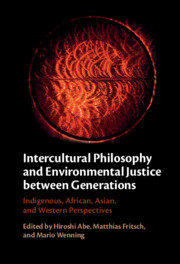 Intercultural Philosophy and Environmental Justice between Generations
Intercultural Philosophy and Environmental Justice between Generations from Part I - Indigenous Philosophies on Justice between Generations
Published online by Cambridge University Press: 14 March 2024
Indigenous philosophies bring to life the idea that we are all part of an intergenerational journey. Each of us are born in the imaginations of generations past, with the responsibility to set the course for the journeys that follow. To embed this intergenerational thinking, Indigenous philosophies emphasize the importance of nourishing and regenerative relationships. This chapter explores some of these ideas and describes how they enhance relationships through regenerative practices, invest in relational repair, and enable the ongoing transformation of concepts and ideas toward new imaginaries. In so doing, the paper notes some of the ways that policies and processes can they function to realize intergenerational justice and ground an enduring sense of responsibility to its pursuit and realization.
To save this book to your Kindle, first ensure no-reply@cambridge.org is added to your Approved Personal Document E-mail List under your Personal Document Settings on the Manage Your Content and Devices page of your Amazon account. Then enter the ‘name’ part of your Kindle email address below. Find out more about saving to your Kindle.
Note you can select to save to either the @free.kindle.com or @kindle.com variations. ‘@free.kindle.com’ emails are free but can only be saved to your device when it is connected to wi-fi. ‘@kindle.com’ emails can be delivered even when you are not connected to wi-fi, but note that service fees apply.
Find out more about the Kindle Personal Document Service.
To save content items to your account, please confirm that you agree to abide by our usage policies. If this is the first time you use this feature, you will be asked to authorise Cambridge Core to connect with your account. Find out more about saving content to Dropbox.
To save content items to your account, please confirm that you agree to abide by our usage policies. If this is the first time you use this feature, you will be asked to authorise Cambridge Core to connect with your account. Find out more about saving content to Google Drive.